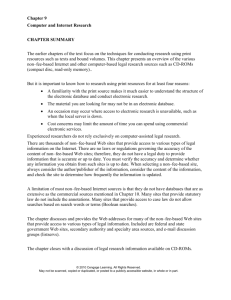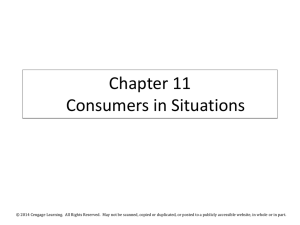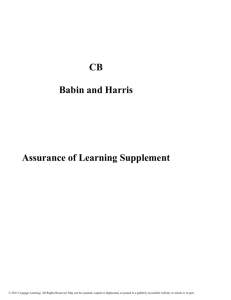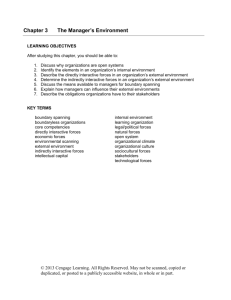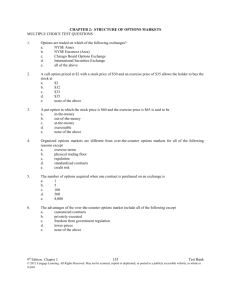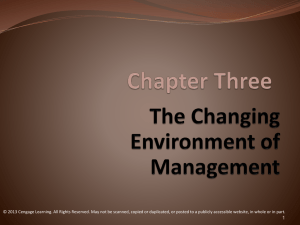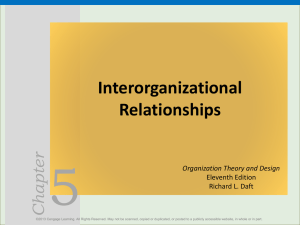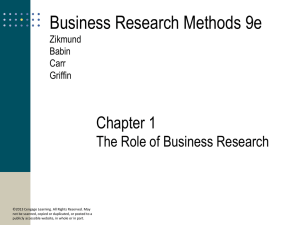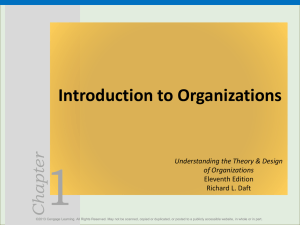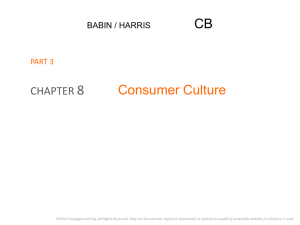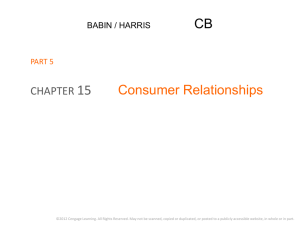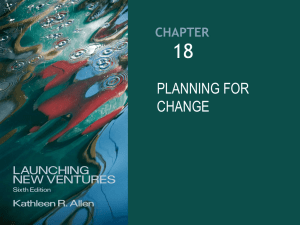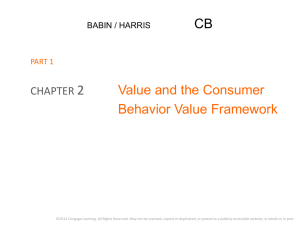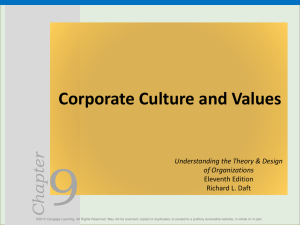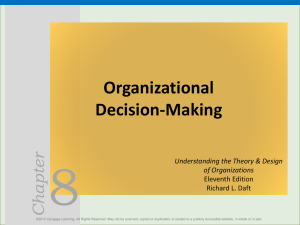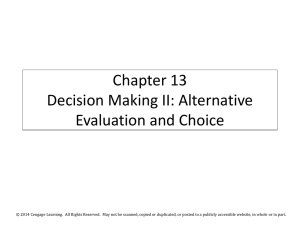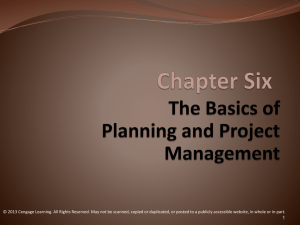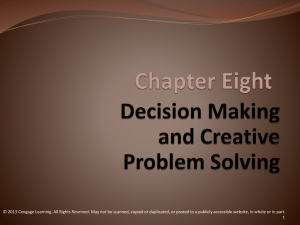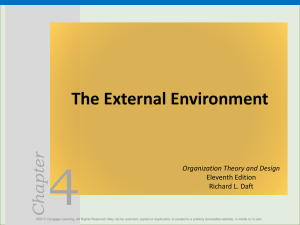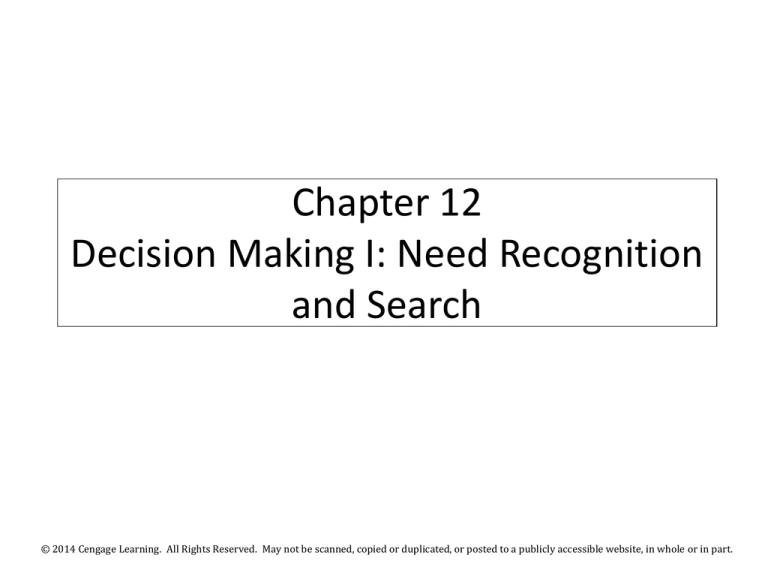
Chapter 12
Decision Making I: Need Recognition
and Search
© 2014 Cengage Learning. All Rights Reserved. May not be scanned, copied or duplicated, or posted to a publicly accessible website, in whole or in part.
Learning Outcomes
• Understand the activities involved in the
consumer decision-making process
• Describe the three major decision-making
research perspectives
• Explain the three major types of decisionmaking approaches
© 2014 Cengage Learning. All Rights Reserved. May not be scanned, copied or duplicated, or posted to a publicly accessible website, in whole or in part.
Learning Outcomes
• Understand the importance of the
consideration set in the decision-making
process
• Understand the factors that influence the type
and amount of search performed by
consumers
© 2014 Cengage Learning. All Rights Reserved. May not be scanned, copied or duplicated, or posted to a publicly accessible website, in whole or in part.
© 2014 Cengage Learning. All Rights Reserved. May not be scanned, copied or duplicated, or posted to a publicly accessible website, in whole or in part.
© 2014 Cengage Learning. All Rights Reserved. May not be scanned, copied or duplicated, or posted to a publicly accessible website, in whole or in part.
Decision Making and Choice
Decision Making and Value
Decision Making and Motivation
Decision Making and Emotion
© 2014 Cengage Learning. All Rights Reserved. May not be scanned, copied or duplicated, or posted to a publicly accessible website, in whole or in part.
© 2014 Cengage Learning. All Rights Reserved. May not be scanned, copied or duplicated, or posted to a publicly accessible website, in whole or in part.
Decision-Making Approaches
• Perceived risk - Perception of the negative
consequences that are likely to result from a
course of action
• Types of risk
– Financial
– Social
– Performance
– Physical
– Time
© 2014 Cengage Learning. All Rights Reserved. May not be scanned, copied or duplicated, or posted to a publicly accessible website, in whole or in part.
© 2014 Cengage Learning. All Rights Reserved. May not be scanned, copied or duplicated, or posted to a publicly accessible website, in whole or in part.
Need Recognition
• Actual state - A consumer’s perceived current
state
• Desired state - A perceived state for which a
consumer strives
• Consumer search behavior - The behaviors
that consumers engage in as they seek
information that can be used to satisfy needs
© 2014 Cengage Learning. All Rights Reserved. May not be scanned, copied or duplicated, or posted to a publicly accessible website, in whole or in part.
Search Behavior
Ongoing
External
Information
Overload
Prepurchase
Internal
© 2014 Cengage Learning. All Rights Reserved. May not be scanned, copied or duplicated, or posted to a publicly accessible website, in whole or in part.
© 2014 Cengage Learning. All Rights Reserved. May not be scanned, copied or duplicated, or posted to a publicly accessible website, in whole or in part.
External Search
• Includes the gathering of information from
external sources
• Factors considered
– Ease of obtaining information from the source
– Objectivity of the source
– Trustworthiness of the source
– The speed with which the information can be
obtained
© 2014 Cengage Learning. All Rights Reserved. May not be scanned, copied or duplicated, or posted to a publicly accessible website, in whole or in part.
External Search and Emerging
Technologies
Lowers Search Costs
Provides Hedonic Value
Information Control
© 2014 Cengage Learning. All Rights Reserved. May not be scanned, copied or duplicated, or posted to a publicly accessible website, in whole or in part.
Amount of Search
•
•
•
•
•
•
•
•
Product experience
Involvement
Perceived risk
Value of search effort
Time availability
Attitude toward shopping
Personal factors
Situational influencers
© 2014 Cengage Learning. All Rights Reserved. May not be scanned, copied or duplicated, or posted to a publicly accessible website, in whole or in part.
© 2014 Cengage Learning. All Rights Reserved. May not be scanned, copied or duplicated, or posted to a publicly accessible website, in whole or in part.
Search Regret
• Refers to the negative emotions that come
from failed search processes
• Regret is related to:
– The amount of search effort
– The emotions felt during the process
– The use of unfamiliar search techniques
© 2014 Cengage Learning. All Rights Reserved. May not be scanned, copied or duplicated, or posted to a publicly accessible website, in whole or in part.


